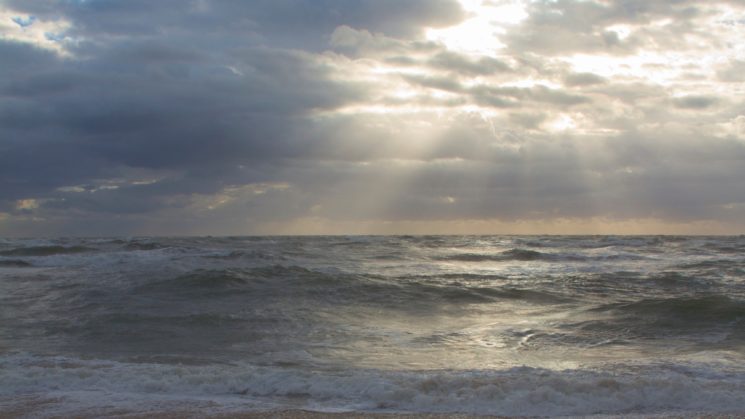
Above: Early morning at Cape Point in Cape Hatteras National Seashore. Photograph courtesy of NPS.
Editor’s Note: Today, Thursday, May 16, the National Weather Service has issued a HIGH RISK for rip currents on North Carolina Beaches from Duck to Topsail Island. As the season for lifeguards has not started, forecasters and local officials advise you to NOT go into the ocean today.
Thus, the beach safety messages offered below by the National Park Service not only are especially timely today — but also should be kept in mind all season whenever you visit a beach with a surf zone. NPS rangers work closely with North Carolina Sea Grant and the National Weather Service, including posting 200 rip current safety signs and sharing other educational materials. For more information, and links to daily NWS rip current outlooks for beaches around the nation, go online to: ripcurrents.noaa.gov.
The Atlantic Ocean produces a number of safety challenges for underprepared visitors every year. Providing ocean safety and rip current awareness information to visitors is a top priority at Cape Hatteras National Seashore, below identified as “The Seashore.” The following trip planning tips will help visitors stay safe in the ocean.
Rip currents are powerful, channeled currents of water flowing away from shore. They typically extend from the shoreline, through the surf zone, and past the line of breaking waves. Rip currents can occur at any beach with breaking waves.
If you find yourself caught in a rip current, don’t swim against the current. FLOAT, DON’T FIGHT! Remain calm and swim across the current — parallel to the shore. Slowly work your way back to the beach at an angle. If you are still unable to reach the beach, draw attention to yourself by waving your arms and yelling for help.

Lifeguards are on duty from Memorial Day weekend through Labor Day, 9:00 am to 5:00 pm, seven days a week at four locations in Cape Hatteras National Seashore.
Lifeguarded beaches are by far the safest places to swim at the Seashore. There are four beach locations on the Seashore that are staffed with lifeguards from Memorial Day weekend through Labor Day (9 a.m.-5 p.m.). The locations of the four lifeguarded beaches are:
Coquina Beach Access (Bodie Island)
Located across from the Bodie Island Lighthouse site
Cape Hatteras Lighthouse Beach Access (Hatteras Island)
Adjacent to the Old Cape Hatteras Lighthouse site
NEW for 2019! Frisco Beach Access (Hatteras Island)
Located just south of Frisco Village
Ocracoke Beach Access (Ocracoke Island)
1.5 miles south of the Seashore campground or ½ mile north of Ocracoke Village
Swim at beaches patrolled by lifeguards.
Bring something in the water with you that floats. Rather than struggling through a rip current and exhausting yourself, use that item to easily float away from the rip current. Float, don’t fight.
Swimming in the Atlantic Ocean is not the same as swimming in a pool or a lake. Ocean swimming can be very physically taxing and may exacerbate underlying medical issues in older swimmers.
The majority (90%) of swimming-related deaths off the Seashore over the last three years (2016-2018) involved males over the age of 50. There were also three deaths of teenage males ages 17 to 18. Two women died, whose average age was 71.
A perfect day on the beach doesn’t always mean that it’s a perfect day in the ocean.
Check the beach forecast before visiting the beach. If in doubt, don’t go out.
Never swim alone. Swim with a buddy, and have adult supervision for all children. Have someone on shore keep an eye on you while you swim/surf/wade in the water.
Remember, many people drown while trying to save someone else from a rip current. Use flotation and make safe choices.
Be aware that the ocean presents additional hazards, such as shorebreak, high surf and longshore currents. Learn more at lovethebeachrespecttheocean.com.
Avoid wearing shiny objects that may attract sharks and other fish.
Avoid swimming where danger is present: in rough seas, inlets, around fishing piers and surfers, at night or during thunderstorms.
The Outer Banks and Cape Hatteras National Seashore are beautiful places to visit. Please take some time to learn this important information to help ensure you create wonderful memories with your families.
Park Rangers provide ocean safety tips before every interpretive ranger talk at Cape Hatteras National Seashore, Fort Raleigh National Historic Site and Wright Brothers National Memorial. In 2018, ocean safety tips were given to over 76,000 visitors at interpretive ranger talks.
There are over 200 ocean safety-related signs along the Seashore! Please read them.
The Seashore has partnered with Dare County and local agencies on an ocean safety awareness campaign called, “Love The Beach, Respect The Ocean”: lovethebeachrespecttheocean.com.
Text “Join OBXBeachConditions” to 30890 to sign up for text alerts on beach conditions.
While on the beach, search for and use the #LoveTheBeachRespectTheOcean hashtag on social media. The Seashore posts the daily beach forecast and ocean safety information on its website and social media (Facebook and Twitter):
Cape Hatteras National Seashore: Official Website | Facebook | Instagram | Twitter
Fort Raleigh National Historic Site: Official Website | Facebook | Instagram | Twitter
Wright Brothers National Memorial: Official Website | Facebook | Instagram | Twitter